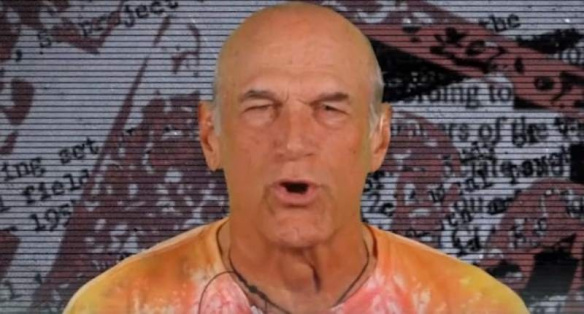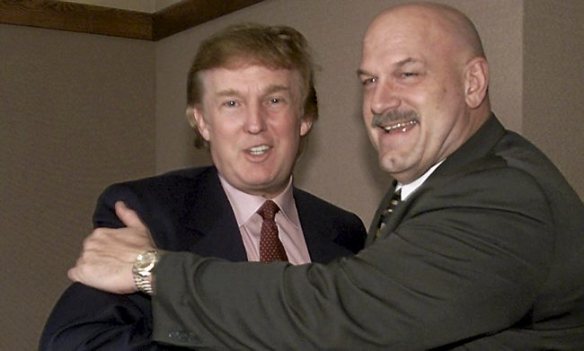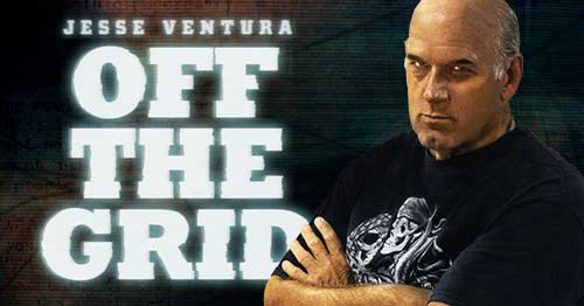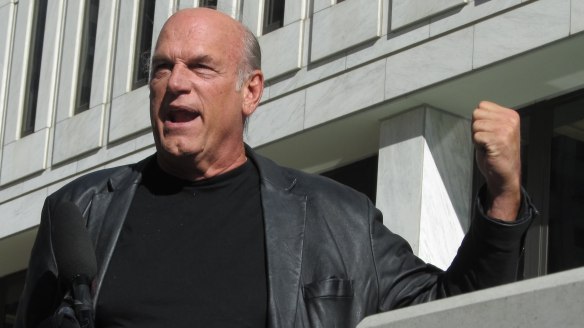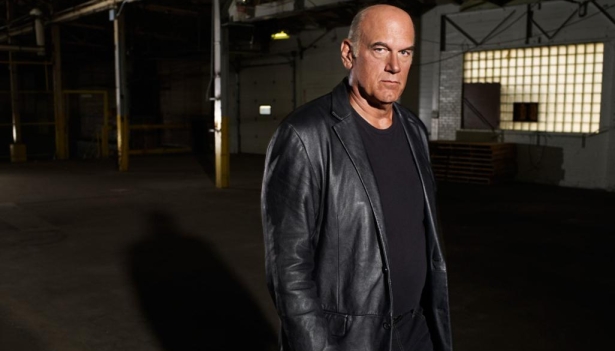
TruTV
Most retired governors use their connections to assume quiet but well-paid positions in the private sector, or loud but well-paid positions as commentators on cable news networks. Former Minnesota Governor Jesse Ventura lately, though, has been prowling obscure government facilities, confronting squirming civil servants, and demanding “the truth” while hosting a reality television show on truTV called Conspiracy Theory With Jesse Ventura.
In the third season, the show has hit its stride. Two lackluster investigators have been replaced with Jesse Ventura’s son Tyrel and Oliver Stone’s son Sean. The chemistry is great. Tyrel is skinny and slightly awkward and dresses like Humphrey Bogart in The Big Sleep, standing in stark contrast from his ranting hulk of a father. Sean Stone is leather-clad and rebellious, assigned only the most dangerous missions. A third investigator, June Sarpong, is a British West African with a posh accent and an MBE (Member of the British Empire, a step below a knighthood). The subject matter will be familiar to anyone interested in conspiracies, but is presented with flair. White vans pull up and reveal contacts (who always seem to be old cronies of Ventura’s). The team interviews mad colonels, mystics and time travelers. It moves along at a relentless pace with considerable charm.
It’s entertaining stuff, and the ratings are blockbuster for cable. About 1.5 million people watch the premiere of each episode, and many more see the series in reruns. But for all its goofy appeal,Conspiracy Theory has occasionally seemed to strike on something real-and, as befits both his program’s subject matter and his own personal history, Ventura now is convinced that someone is out to shut the program down.
The suspicions began in November 2010, when truTV aired a doozy of an episode, called “Police State.” It was spliced with footage of World War II concentration camps and implied that FEMA could be about to institute martial law. The team explored a network of government centers that use data-mining software to comb through intelligence gathered by federal agencies, presumably to look for potential terror suspects. (It would work a bit like Google’s keyword advertising: The software might flag someone whose emails to Pakistan mentioned crop-spraying, the precursors for Sarin gas, for example.) They interviewed a young Ron Paul supporter who was put on a government watch list for no apparent reason. Then the team infiltrated a storage facility containing hundreds of thousands of plastic grave liners. Next stop was a pair of mysterious government installations that looked like prisons but had playgrounds attached to them. Finally Ventura flew to Washington D.C. to confront the authors of a bill, H.R. 645 that authorized FEMA to designate military bases as “National Emergency Centers.”
“It’s clear they’re doing everything they can to make it a failure so they don’t have to renew it,” Ventura said. The “they” he refers to is vaguely defined.
Rep. Jim Gerlach (R-PA6) refused to meet with Ventura, so Ventura confronted Rep. Steve Cohen, one of the bill’s co-sponsors. Cohen floundered during the interview. He seemed unfamiliar with the bill and flustered by Ventura’s thundering rebukes. After the telecast, he released an op-ed accusing Turner Broadcasting System of gross inaccuracy, condemned the references to the Holocaust, and compared the “dangerously stirred fears” to Timothy McVeigh’s “consuming hatred and distrust of government… The show makes professional wrestling, where Ventura earned his fortune, look like an Olympic sport,” Cohen said.
A typical episode gets rerun dozens of times, but “Police State” aired once and then never again. (It’s circulating on YouTube, uploaded by users who say it’s been “banned.”) A representative of Turner Broadcasting System (which owns truTV) said that the “Prison State” episode did not repeat after the initial telecast because of scheduling considerations. Ventura thinks it’s more than that. He likened it to MSNBC’s cancellation of Donahuein 2003. (Phil Donahue insinuated that his anti-war stance was responsible for his firing. An NBC Executive told The New York Times that the show’s cost and disappointing ratings were to blame.) He has taken issue with some last-minute scheduling changes that could hurt the show’s ratings. And he points out that an episode he and his team filmed for this season, about whether the TSA’s full-body scanners are carcinogenic, was shelved by network execs.
“It’s clear they’re doing everything they can to make it a failure so they don’t have to renew it,” Ventura said when he appeared on The Alex Jones Show‘s Infowars Nightly News on November 28. The “they” he refers to, as is typical with conspiracy theories, is vaguely defined. “Look at what the facts are,” he said on a follow-up appearance last week. “The FEMA show was taken off, after airing only one time… and the TSA show, again… we completed the show and they chose not to air it. Somebody on their end made the decision. They’ve chosen not to air it. TruTV, the network did. Who influenced truTV to do that, I do not know.”
That speculation has a friend in Alex Jones, an affable Texan with a devoted following who believes an elite cabal of globalists (mostly the scions of old British banking families) are using the Federal Reserve to take over the United States, reduce us all to toothless dependency, and will one day trigger a catastrophe that culls the population to a more manageable size. He is a frequent guest onConspiracy Theory with Jesse Ventura, particularly on episodes that concern the U.S. government and seem to point to a grander, more unified conspiracy theory. Ventura doesn’t agree with his one-world government ideas, though says that “after doing the show, nothing seems beyond belief.”
While the implication of sinister motives for cable-TV programming decisions may be far-fetched, Ventura’s right, at least, that some genres of conspiracy investigations are safer, more attractive bets for a TV station than others. The most outlandish ones, like those featuring reptilians or time travel, are neatly and entertainingly debunked or discredited by Ventura’s team. Theories that involve government malfeasance are a different breed entirely. Some haven’t been so implausible. The fusion centers that skim our data are undeniably creepy. So too was the massive excavation uncovered in the Ozark Mountains during Season Three.
But the more specious government-related theories, like FEMA camps, present a dilemma. Cohen’s reference to Timothy McVeigh may seem alarmist, but there’s obviously danger involved in propagating extreme views of the government. Ventura, though, thinks the audience is smart enough to separate truth from speculation.
“People should take the show with a grain of salt,” he says. “[The way it works] is that someone brings us the conspiracy, and if there’s enough meat on the bone, we’ll put our team on it, and if someone we interview tells us a lie we can only look into it.”
That answer may not always be acceptable to, say, truTV’s lawyers who are worried about the network being taken to court for slander. But Ventura’s never gotten along all that well with authority. As a professional wrestler he sued his employer, Titan Sports, to retrieve royalties. When he retired he blamed blood clots in his lungs allegedly caused by his wartime exposure to Agent Orange. More recently he’s sued the TSA and Chris Kyle, a Navy SEAL sniper who accused Ventura of defaming the SEALs.
Yet for all his rabble rousing, Ventura seems sincere. He comes off as genuinely protective of his inner circle and personally afflicted by the canceled episodes. That accusations of censorship get more people talking about—and potentially watching the show—is just a coincidence. Or is it?
